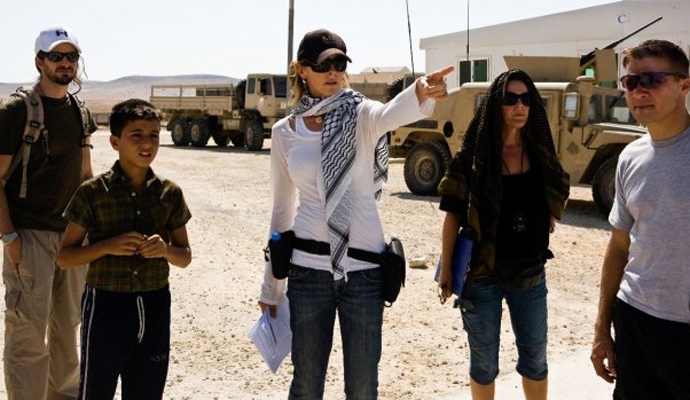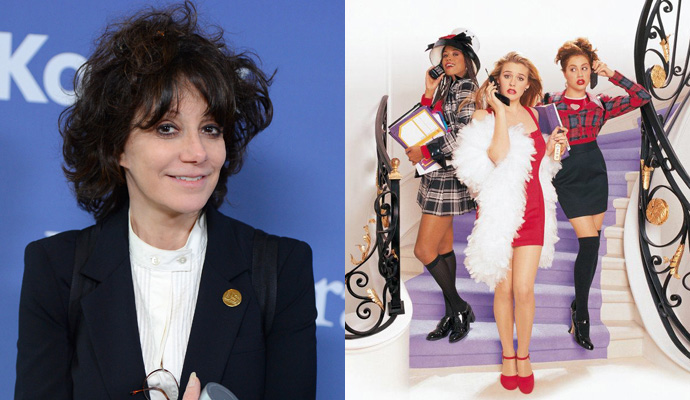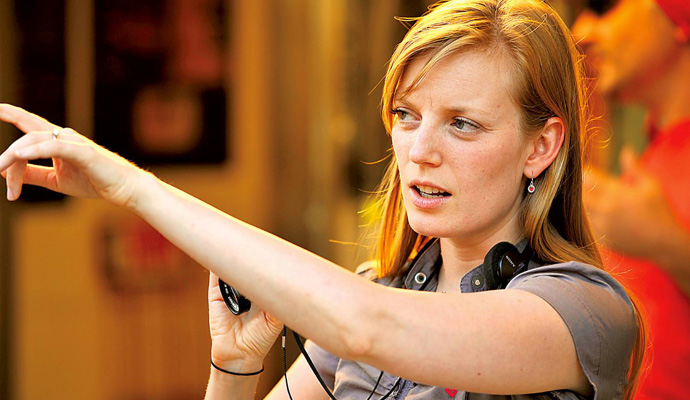Girls on Film: A gift guide for film fans
Not sure what to buy for the cinephile in your life this holiday season? Check out our comprehensive guide to brilliant movies by female filmmakers.


A free daily email with the biggest news stories of the day – and the best features from TheWeek.com
You are now subscribed
Your newsletter sign-up was successful
It was clear from the first moments of 2013 that this wasn't going to be a banner year for female filmmakers. Last year was packed with excellent films helmed by women, from Dee Rees's Pariah to Lynne Ramsay's We Need to Talk About Kevin. In contrast, less than 5 percent of 2013's film slate consisted of movies directed by women. We're now marching into an awards season characterized by op-eds with depressingly familiar titles like "Women Directors Nearly Absent in 2013 Awards Season."
One of the problems discussed in the above piece is the idea of risk — that choosing not to employ filmmakers who happen to be female is a way to minimize the risk of a box-office bomb. It's a weak argument, of course; women have offered great films for years, from art house greats to moneymaking powerhouses. But part of the problem is remembering that those movies exist — and keeping them alive in the forefront of our minds and in popular conversation.
The gift-giving season is the perfect time to fill in some of those holes. Instead of buying someone the latest popular flick on DVD, reach into history.
The Week
Escape your echo chamber. Get the facts behind the news, plus analysis from multiple perspectives.

Sign up for The Week's Free Newsletters
From our morning news briefing to a weekly Good News Newsletter, get the best of The Week delivered directly to your inbox.
From our morning news briefing to a weekly Good News Newsletter, get the best of The Week delivered directly to your inbox.
THE OSCAR CROWD

Giving an Oscar-centric gift set is just about the easiest present there is, because there are only four films in history directed by women that have earned a Best Director nomination. They are:
Lina Wertmüller for Seven Beauties: This film focuses on a criminal sent to the army, who escapes during World War II, only to get captured by the Germans and sent to a prison camp. The film is also part of "The Lina Wertmuller Collection."
Jane Campion for The Piano: The 1993 film stars Holly Hunter as a mute woman who communicates through her piano. She is sold into marriage with one man while being drawn to another. Though Campion didn't win the Oscar for Best Director, the film nabbed Best Actress, Best Supporting Actress, and Best Original Screenplay.
A free daily email with the biggest news stories of the day – and the best features from TheWeek.com
Sofia Coppola for Lost in Translation: Following in her famous father's footsteps, Coppola courted big success with her second feature, which follows a blossoming friendship between an aging actor (Bill Murray) and a recent graduate (Scarlett Johansson) experiencing culture shock in Tokyo. Coppola won an Oscar for Best Screenplay, as the film enjoyed an impressive $120 million gross on a budget of $4 million.
Kathryn Bigelow for The Hurt Locker: Finally, in 2009, Bigelow became the first woman to win a Best Director Oscar. The win solidified her standing as the female director at the top of every movie wish list, as she won for her gritty look at a bomb disposal team during the Iraq War.
This doesn't, however, mean that the countless other female-directed films got no love. Nominees who missed Oscar nods while earning other recognition include Debra Granik for the Jennifer Lawrence–starring Winter's Bone, Marleen Gorris for Antonia's Line (Best Foreign Language Film winner), Deepa Mehta for Water, and Penny Marshall for Awakenings. And that's on top of the nominees and winners for short and documentary films, like Jessica Yu's Documentary Short winner Breathing Lessons.
NOTABLE AMERICANS

Any discussion of American female contributions to cinema usually focus on Kathryn Bigelow and Sofia Coppola, but they are just two of many, who include:
Julie Dash has barely entered the mainstream, but her contribution to film has been significant. Her 1992 film Daughters of the Dust became the first full-length film directed by an African-American woman to get theatrical distribution. A 2004 addition to the U.S. National Film Registry, Dust follows three generations of South Carolina women preparing to migrate North. Dash has also released a making-of book and a novel that continues the story.
Elaine May's filmmaking had highs (The Heartbreak Kid) and notorious lows (Ishtar), but her contributions stretched across the industry. She had a super-popular comedy duo with Graduate filmmaker Mike Nichols; earned writing Oscar nominations for Primary Colors and Heaven Can Wait; garnered a Golden Globe nomination for acting in her writer-director-star film A New Leaf; offered uncredited contributions to the likes of Reds, Tootsie, and Labyrinth; and inspired comedians like Steve Martin and Lily Tomlin.
Delighting in Elaine May should also lead one to Nora Ephron, once named "Elaine May's long-lost soul sister separated at birth."
Amy Heckerling is one of the few female filmmakers to boast multiple cult hits. It began in 1982, with the arrival of her feature film debut and Cameron Crowe's first screenplay, Fast Times at Ridgemont High — a film that launched the careers of future stars like Nicolas Cage, Sean Penn, and Forest Whitaker. She went on to helm comedies like European Vacation and the first two Look Who's Talking flicks before hitting gold again with Clueless.
Lois Weber is one of Hollywood's pioneering filmmakers, said to have been given her start by Alice Guy-Blaché and her husband. Between 1911 and 1934, Weber directed well over 100 films — including The Blot and Where Are My Children — that delved into social issues, birth control, religion, and even Shakespeare. She co-directed The Merchant of Venice, becoming the first woman to direct a feature-length film in the U.S.
Julie Taymor started studying experimental theater out of college, becoming the director who brought The Lion King to the stage. She then dove deep into the world of Shakespeare, with her Titus making a gorgeous and violent splash in cinema. She also examined the life of an artist with Frida, the poetry of the Beatles with Across the Universe, and, most recently, more Shakespeare with her gender-bending The Tempest.
Plus: Adrienne Shelly, Penny Marshall, Ida Lupino, Nancy Meyers, Lisa Cholodenko, Ava Duvernay, Nicole Holofcener, Lynn Shelton, Miranda July, Kelly Reichardt, Catherine Hardwicke, Kimberly Peirce, Karyn Kusama, Mary Harron, Penelope Spheeris, Kasi Lemmons…
FOREIGN WONDERS

Jane Campion and Lina Wertmüller are only part of a huge list of foreign female filmmakers who have not only helped to form the craft, but also offered some of the best venues for women in film in recent years. They include:
Alice Guy-Blaché is, after many years out of the spotlight, slowly gaining the reputation she deserves as one of cinema's first filmmakers. Bit by bit, her films are being rediscovered, including A Fool and His Money (boasting the first all-black cast), the 1916 romance The Ocean Waif, and a half-hour religious epic, The Birth, the Life, and the Death of Christ.
Over her 56-year career, Agnès Varda has tallied 50 credits to her name, and earned a Palme d'Or nomination and FIPRESCI wins. However, her accolades rest more with cinephiles than the general public, even after earning the title "Godmother of the New Wave." Cleo from 5 to 7 remains her most famous film, about a woman who strolls the streets of Paris as she waits for the results of a medical test. A Criterion collection called "4 by Agnes Varda" offers the noted film along with three more: La Pointe Courte, Le Bonheur, and Vagabond.
Sarah Polley is the youngest on this list, and boasts only three feature films, but has already shown a level of skill that eludes many filmmakers over their lifetimes. After a long career as a child actor and activist, Polley hopped into the directorial chair and earned a Best Screenplay Oscar nomination for her debut, Away From Her. The divisive Take This Waltz came in 2011, which was quickly followed by the stunning documentary Stories We Tell — a favorite on many year-end lists, and an Oscar hopeful.
Leni Riefenstahl is an always controversial choice, whose infamous ties with the Nazis are as legendary as her pioneering cinematic techniques. Between her 1936 Winter Olympics film Olympia, her long-banned propaganda film Triumph of the Will, and features like The Blue Light, Riefenstahl helped expand the cinematic form with innovative techniques that led film scholar Mark Cousins to name her "the most technically talented Western filmmaker of her era" next to Orson Welles and Alfred Hitchcock.
Andrea Arnold didn't start as a director, but as a television presenter — until she retired, studied with the AFI Conservatory, and won an Oscar for her third short film, Wasp. Three years later brought her stunning feature debut (with characters co-written by An Education director Lone Scherfig) Red Road. Then came the BAFTA-winning Fish Tank, which was also one of Michael Fassbender's breakout roles. Her latest film is the deeply atmospheric Wuthering Heights.
See also: Fellow Brit Lynne Ramsay, who won the Cannes Jury Prize with her early short film Small Deaths, before breaking out with three killer features: Ratcatcher, Morvern Callar, and We Need to Talk About Kevin.
Plus: Claire Denis, Marjane Satrapi, Isabel Coixet, Lone Scherfig, Sally Potter, Mira Nair, Susanne Bier, Deepa Mehta, Antonia Bird, Anne Fontaine, Agnieszka Holland, Margarethe von Trotta, Gurinder Chadha, Niki Caro…
Girls on Film is a weekly column focusing on women and cinema. It can be found at TheWeek.com every Friday morning. And be sure to follow the Girls on Film Twitter feed for additional femme-con.
Monika Bartyzel is a freelance writer and creator of Girls on Film, a weekly look at femme-centric film news and concerns, now appearing at TheWeek.com. Her work has been published on sites including The Atlantic, Movies.com, Moviefone, Collider, and the now-defunct Cinematical, where she was a lead writer and assignment editor.
-
 The ‘ravenous’ demand for Cornish minerals
The ‘ravenous’ demand for Cornish mineralsUnder the Radar Growing need for critical minerals to power tech has intensified ‘appetite’ for lithium, which could be a ‘huge boon’ for local economy
-
 Why are election experts taking Trump’s midterm threats seriously?
Why are election experts taking Trump’s midterm threats seriously?IN THE SPOTLIGHT As the president muses about polling place deployments and a centralized electoral system aimed at one-party control, lawmakers are taking this administration at its word
-
 ‘Restaurateurs have become millionaires’
‘Restaurateurs have become millionaires’Instant Opinion Opinion, comment and editorials of the day
